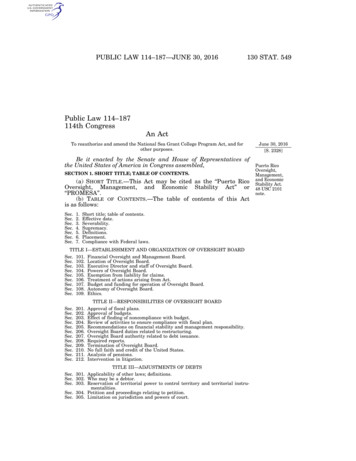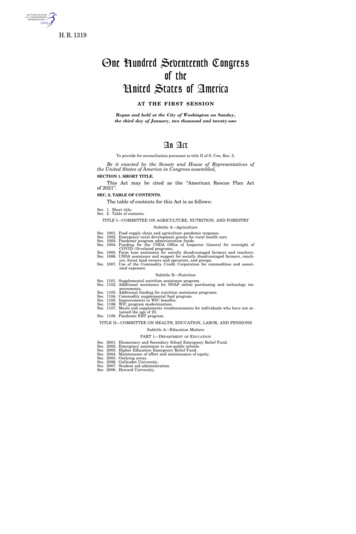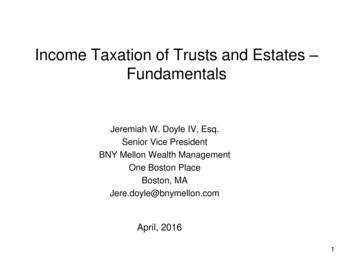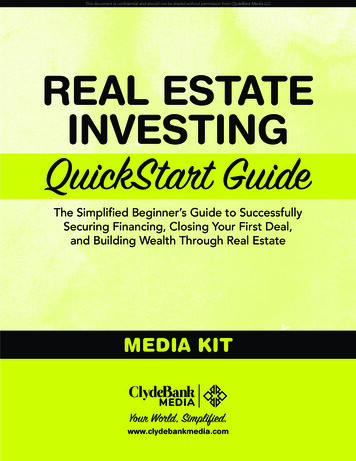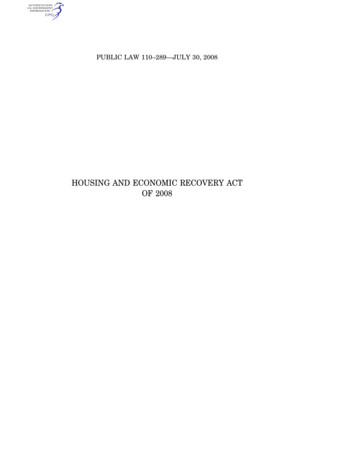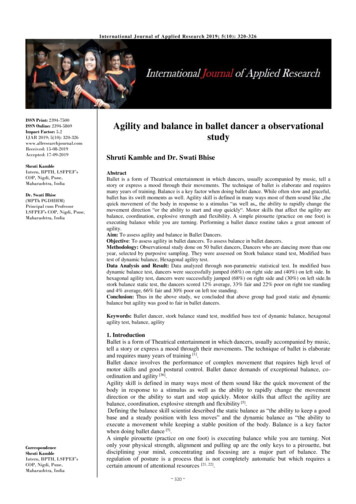
Transcription
Saving and InvestingA Roadmap To Your Financial SecurityThrough Saving and InvestingInformation is an investor’s best toolA ROADMAP TO YOUR JOURNEY TO FINANCIAL SECURITY 1
2 SAVING AND INVESTING
Dear ReaderWhile money doesn’t grow on trees, it can grow whenyou save and invest wisely.Knowing how to secure your financial well-being is oneof the most important things you’ll ever need in life. Youdon’t have to be a genius to do it. You just need to knowa few basics, form a plan, and be ready to stick to it. Nomatter how much or little money you have, the importantthing is to educate yourself about your opportunities. Inthis brochure, we’ll cover the basics on saving and investing.At the SEC, we enforce the laws that determine how investments are offered and sold to you. These laws protect investors, but you need to do your part, too. Part of this brochuretells you how to check out investments and the people thatsell them so you do not fall victim to fraud or costly mistakes.No one can guarantee that you’ll make money frominvestments you make. But if you get the facts about saving and investing and follow through with an intelligentplan, you should be able to gain financial security overthe years and enjoy the benefits of managing your money.Please feel free to contact us with any of your questions or concerns about investing. It always pays to learnbefore you invest. And congratulations on taking yourfirst step on the road to financial security!U.S. Securities and Exchange CommissionOffice of Investor Education and Advocacy100 F Street, N.E.Washington, D.C. 20549-0213Toll-free: (800) SEC-0330Website: www.investor.govA ROADMAP TO YOUR JOURNEY TO FINANCIAL SECURITY 1
2 SAVING AND INVESTING
Don’t Wait to Get StartedYOU CAN DO IT!IT’S EASIER THAN YOU THINK.No one is born knowing how to save or to invest. Every successful investor starts with the basics—the information in thisbrochure.A few people may stumble into financial security—a wealthyrelative may die, or a business may take off. But for most people, the only way to attain financial security is to save and invest over a long period of time.Time after time, people of even modest means who beginthe journey reach financial security and all that it promises:buying a home, educational opportunities for their children,and a comfortable retirement. If they can do it, so can you!KEYS TO FINANCIAL SUCCESS1. Make a financial plan.2. Pay off any high interest debts.3. Start saving and investing as soon as you’ve paid off your debts.A ROADMAP TO YOUR JOURNEY TO FINANCIAL SECURITY 3
Your First Step—Making aFinancial PlanWhat are the things you want to save and invest for? a homea caran educationa comfortable retirementyour childrenmedical or other emergenciesperiods of unemploymentcaring for parentsMake your own list and then think about which goals are themost important to you. List your most important goals first.Decide how many years you have to meet each specific goal,because when you save or invest you’ll need to find a savings orYOUR FINANCIAL GOALSIf you don’t know where you are going, you may end up somewhere you don’t wantto be. To end up where you want to be, you’ll need a roadmap, a financial plan.What do you want to save or invest for?By when?1.2.3.4.5.4 SAVING AND INVESTING
investment option that fits your time frame for meeting each goal.Many tools exist to help you put your financial plan together.You’ll find a wealth of information, including calculators andlinks to non-commercial resources at www.investor.gov.KNOW YOUR CURRENT FINANCIAL SITUATIONSit down and take an honest look at your entire financial situation. You can never take a journey without knowing whereyou’re starting from, and a journey to financial security is nodifferent. You’ll need to figure out on paper your current situation—what you own and what you owe. You’ll be creating a“net worth statement.” On one side of the page, list what youown. These are your “assets.” And on the other side list whatyou owe other people, your “liabilities” or debts.YOUR NET WORTH STATEMENTAssetsCurrent Value LiabilitiesAmountCashMortgage balanceChecking accountsCredit cardsSavingsBank loansCash value of lifeinsuranceCar loansRetirement accountsStudent loansReal estateOtherHomeOther investmentsPersonal propertyTOTALTOTALA ROADMAP TO YOUR JOURNEY TO FINANCIAL SECURITY 5
Subtract your liabilities from your assets. If your assets are largerthan your liabilities, you have a “positive” net worth. If your liabilities are greater than your assets, you have a “negative” net worth.You’ll want to update your “net worth statement” every yearto keep track of how you are doing. Don’t be discouraged ifyou have a negative net worth. If you follow a plan to get intoa positive position, you’re doing the right thing.KNOW YOUR INCOME AND EXPENSESThe next step is to keep track of your income and your expenses for every month. Write down what you and others inyour family earn, and then your monthly expenses.PAY YOURSELF OR YOUR FAMILY FIRSTInclude a category for savings and investing. What are youpaying yourself every month? Many people get into the habitof saving and investing by following this advice: always payyourself or your family first. Many people find it easier to paythemselves first if they allow their bank to automatically remove money from their paycheck and deposit it into a savingsor investment account.Likely even better, for tax purposes, is to participate in anemployer-sponsored retirement plan such as a 401(k), 403(b),or 457(b). These plans will typically not only automatically deduct money from your paycheck, but will immediately reducethe taxes you are paying. Additionally, in many plans the employer matches some or all of your contribution. When youremployer does that, it’s offering “free money.”Any time you have automatic deductions made from yourpaycheck or bank account, you’ll increase the chances of beingable to stick to your plan and to realize your goals.6 SAVING AND INVESTING
FINDING MONEY TO SAVE OR INVESTIf you are spending all your income, and never have money tosave or invest, you’ll need to look for ways to cut back on yourexpenses. When you watch where you spend your money, youwill be surprised how small everyday expenses that you can dowithout add up over a year.KNOW YOUR INCOME AND WHAT YOU SPENDMonthly IncomeMonthly ExpensesSavingsInvestmentsHousingRent or erty ionRecreationChild careHealth careGiftsOtherTOTALA ROADMAP TO YOUR JOURNEY TO FINANCIAL SECURITY 7
Small Savings Add Upto Big MoneyHow much does a cup of coffee cost you?If you buy a cup of coffee every day for 1.00 (an awfully good pricefor a decent cup of coffee, nowadays), that adds up to 365.00 a year.If you saved that 365.00 for just one year, and put it into a savingsaccount or investment that earns 5% a year, it would grow to 465.84by the end of 5 years, and by the end of 30 years, to 1,577.50.That’s the power of “compounding.”With compound interest, youearn interest on the money you save and on the interest that moneyearns. Over time, even a small amount saved can add up to big money.If you are willing to watch what you spend and look forlittle ways to save on a regular schedule, you can make moneygrow. You just did it with one cup of coffee.If a small cup of coffee can make such a huge difference, startlooking at how you could make your money grow if you decided to spend less on other things and save those extra dollars.If you buy on impulse, make a rule that you’ll always wait24 hours to buy anything. You may lose your desire to buy itafter a day. And try emptying your pockets and wallet of sparechange at the end of each day. You’ll be surprised how quicklythose nickels and dimes add up!PAY OFF CREDIT CARD OR OTHER HIGH INTERESTDEBTSpeaking of things adding up, few investment strategies pay off aswell as, or with less risk than, merely paying off all high interestdebt you may have.Many people have wallets filled with credit cards, some ofwhich they’ve “maxed out” (meaning they’ve spent up to their8 SAVING AND INVESTING
credit limit). Credit cards can make it seem easy to buy expensivethings when you don’t have the cash in your pocket—or in thebank. But credit cards aren’t free money.Most credit cards charge high interest rates—as much as 18percent or more—if you don’t pay off your balance in full eachmonth. If you owe money on your credit cards, the wisest thingyou can do is pay off the balance in full as quickly as possible.Virtually no investment will give you the high returns you’ll need tokeep pace with an 18 percent interest charge. That’s why you’rebetter off eliminating all credit card debt before investing savings.Once you’ve paid off your credit cards, you can budget yourmoney and begin to save and invest. Here are some tips foravoiding credit card debt:Put Away the Plastic on’t use a credit card unless your debt is at a manageable level andDyou know you’ll have the money to pay the bill when it arrives.Know What You OweI t’s easy to forget how much you’ve charged on your creditcard. Every time you use a credit card, write down how muchyou have spent and figure out how much you’ll have to pay thatmonth. If you know you won’t be able to pay your balance infull, try to figure out how much you can pay each month andhow long it’ll take to pay the balance in full.Pay Off the Card with the Highest RateI f you’ve got unpaid balances on several credit cards, you shouldfirst pay down the card that charges the highest rate. Pay as muchas you can toward that debt each month until your balance is onceagain zero, while still paying the minimum on your other cards.The same advice goes for any other high interest debt (about 8% orabove) which does not offer the tax advantages of, for example, a mortgage.Now, once you have paid off those credit cards and begun toset aside some money to save and invest, what are your choices?A ROADMAP TO YOUR JOURNEY TO FINANCIAL SECURITY 9
Making Money GrowTHE TWO WAYS TO MAKE MONEYThere are basically two ways to make money.1. You work for money. Someone pays you to work for them or you have your ownbusiness.2. Your money works for you.You take your money and you save or invest it.YOUR MONEY CAN WORK FOR YOU IN TWO WAYSYour money earns money. When your money goes to work,it may earn a steady paycheck. Someone pays you to use yourmoney for a period of time. When you get your money back,you get it back plus “interest.” Or, if you buy stock in a company that pays “dividends” to shareholders, the company may payyou a portion of its earnings on a regular basis.Your money canmake an “income,” just like you. You can make more moneywhen you and your money work.You buy something with your money that could increase in value. You become an owner of something that youhope increases in value over time. When you need your moneyback, you sell it, hoping someone else will pay you more for it. Forinstance, you buy a piece of land thinking it will increase in valueas more businesses or people move into your town.You expect tosell the land in five, ten, or twenty years when someone will buyit from you for a lot more money than you paid.And sometimes, your money can do both at the same time—earn a steady paycheck and increase in value.10 SAVING AND INVESTING
THE DIFFERENCES BETWEEN SAVING AND INVESTINGSavingYour “savings” are usually put into the safest places, or products, that allow you access to your money at any time. Savings products include savings accounts, checking accounts, andcertificates of deposit. Some deposits in these products may beinsured by the Federal Deposit Insurance Corporation or theNational Credit Union Administration. But there’s a tradeofffor security and ready availability. Your money is paid a lowwage as it works for you.After paying off credit cards or other high interest debt,most smart investors put enough money in a savings product tocover an emergency, like sudden unemployment. Some makesure they have up to six months of their income in savings sothat they know it will absolutely be there for them when theyneed it.But how “safe” is a savings account if you leave all of yourmoney there for a long time, and the interest it earns doesn’tkeep up with inflation? What if you save a dollar when it canbuy a loaf of bread. But years later when you withdraw thatdollar plus the interest you earned on it, it can only buy halfa loaf? This is why many people put some of their money insavings, but look to investing so they can earn more over longperiods of time, say three years or longer.InvestingWhen you “invest,” you have a greater chance of losing yourmoney than when you “save.” The money you invest in securities, mutual funds, and other similar investments typicallyis not federally insured. You could lose your “principal”—theamount you’ve invested. But you also have the opportunity toearn more money.A ROADMAP TO YOUR JOURNEY TO FINANCIAL SECURITY 11
THE BASIC TYPES OF PRODUCTSSavingsInvestmentsSavings accountsBondsCertificates of depositStocksChecking accountsMutual fundsReal estateCommodities (gold, silver, etc.)What about risk?All investments involve taking on risk. It’s important that yougo into any investment in stocks, bonds or mutual funds with afull understanding that you could lose some or all of your moneyin any one investment.While over the long term the stock markethas historically provided around 10% annual returns (closer to 6%or 7% “real” returns when you subtract for the effects of inflation),the long term does sometimes take a rather long, long time to playout. Those who invested all of their money in the stock market atits peak in 1929 (before the stock market crash) would wait over20 years to see the stock market return to the same level.However, those that kept adding money to the marketthroughout that time would have done very well for themselves, as the lower cost of stocks in the 1930s made for somehefty gains for those who bought and held over the course ofthe next twenty years or more.It is often said that the greater the risk, the greater the potential reward in investing, but taking on unnecessary risk isoften avoidable. Investors best protect themselves against riskby spreading their money among various investments, hopingthat if one investment loses money, the other investments willmore than make up for those losses. This strategy, called “di12 SAVING AND INVESTING
versification,” can be neatly summed up as, “Don’t put all youreggs in one basket.” Investors also protect themselves fromthe risk of investing all their money at the wrong time (think1929) by following a consistent pattern of adding new moneyto their investments over long periods of time.Once you’ve saved money for investing, consider carefully allyour options and think about what diversification strategy makessense for you. While the SEC cannot recommend any particularinvestment product, you should know that a vast array of investment products exists—including stocks and stock mutual funds,corporate and municipal bonds, bond mutual funds, certificatesof deposit, money market funds, and U.S. Treasury securities.Diversification can’t guarantee that your investments won’tsuffer if the market drops. But it can improve the chances thatyou won’t lose money, or that if you do, it won’t be as much asif you weren’t diversified.What are the best investments for me?The answer depends on when you will need the money,your goals, and if you will be able to sleep at night if you purchase a risky investment where you could lose your principal.For instance, if you are saving for retirement, and you have35 years before you retire, you may want to consider riskierinvestment products, knowing that if you stick to only the “savings” products or to less risky investment products, your moneywill grow too slowly—or, given inflation and taxes, you maylose the purchasing power of your money. A frequent mistakepeople make is putting money they will not need for a verylong time in investments that pay a low amount of interest.On the other hand, if you are saving for a short-term goal,five years or less, you don’t want to choose risky investments,because when it’s time to sell, you may have to take a loss. Sinceinvestments often move up and down in value rapidly, you wantto make sure that you can wait and sell at the best possible time.A ROADMAP TO YOUR JOURNEY TO FINANCIAL SECURITY 13
What are investments all about?When you make an investment, you are giving your moneyto a company or enterprise, hoping that it will be successfuland pay you back with even more money.Stocks and BondsMany companies offer investors the opportunity to buy eitherstocks or bonds. The example below shows you how stocks andbonds differ.Let’s say you believe that a company that makes automobiles may be a good investment. Everyone you know is buyingone of its cars, and your friends report that the company’s carsrarely break down and run well for years. You either have aninvestment professional investigate the company and read asmuch as possible about it, or you do it yourself.After your research, you’re convinced it’s a solid companythat will sell many more cars in the years ahead.The automobile company offers both stocks and bonds.With thebonds, the company agrees to pay you back your initial investmentin ten years, plus pay you interest twice a year at the rate of 8% a year.If you buy the stock, you take on the risk of potentially losing a portion or all of your initial investment if the companydoes poorly or the stock market drops in value. But you alsomay see the stock increase in value beyond what you couldearn from the bonds. If you buy the stock, you become an“owner” of the company.You wrestle with the decision. If you buy the bonds, youwill get your money back plus the 8% interest a year. And youthink the company will be able to honor its promise to you onthe bonds because it has been in business for many years anddoesn’t look like it could go bankrupt. The company has a longhistory of making cars and you know that its stock has goneup in price by an average of 9% a year, plus it has typically paidstockholders a dividend of 3% from its profits each year.14 SAVING AND INVESTING
THE MAIN DIFFERENCES BETWEENSTOCKS AND BONDSStocksBondsIf the company profits or is perceived ashaving strong potential, its stock may goup in value and pay dividends. You maymake more money than from the bonds.The company promises to return moneyplus interest.Risk: The company may do poorly, andyou’ll lose a portion or all of your investment.Risk: If the company goes bankrupt,your money may be lost. But if there isany money left, you will be paid beforestockholders.You take your time and make a careful decision. Only timewill tell if you made the right choice. You’ll keep a close eye onthe company and keep the stock as long as the company keepsselling a quality car that consumers want to drive, and it canmake an acceptable profit from its sales.WHY SOME INVESTMENTS MAKE MONEYAND OTHERS DON’TYou can potentially make money in an investment if: The company performs better than its competitors. ther investors recognize it’s a good company, so that when itOcomes time to sell your investment, others want to buy it. he company makes profits, meaning they make enough money toTpay you interest for your bond, or maybe dividends on your stock.You can lose money if: The company’s competitors are better than it is. Consumers don’t want to buy the company’s products or services. he company’s officers fail at managing the business well, they spendTtoo much money, and their expenses are larger than their profits.A ROADMAP TO YOUR JOURNEY TO FINANCIAL SECURITY 15
ther investors that you would need to sell to think the company’sOstock is too expensive given its performance and future outlook. he people running the company are dishonest. They use yourTmoney to buy homes, clothes, and vacations, instead of using yourmoney on the business. hey lie about any aspect of the business: claim past or future profTits that do not exist, claim it has contracts to sell its products whenit doesn’t, or make up fake numbers on their finances to dupeinvestors. he brokers who sell the company’s stock manipulate the priceTso that it doesn’t reflect the true value of the company. After theypump up the price, these brokers dump the stock, the price falls,and investors lose their money. or whatever reason, you have to sell your investment when theFmarket is down.MUTUAL FUNDSBecause it is sometimes hard for investors to become expertson various businesses—for example, what are the best steel,automobile, or telephone companies—investors often dependon professionals who are trained to investigate companies andrecommend companies that are likely to succeed. Since it takeswork to pick the stocks or bonds of the companies that havethe best chance to do well in the future, many investors chooseto invest in mutual funds.What is a mutual fund?A mutual fund is a pool of money run by a professionalor group of professionals called the “investment adviser.” In amanaged mutual fund, after investigating the prospects of manycompanies, the fund’s investment adviser will pick the stocks16 SAVING AND INVESTING
or bonds of companies and put them into a fund.Investors can buy shares of the fund, and their shares rise orfall in value as the values of the stocks and bonds in the fundrise and fall. Investors may typically pay a fee when they buy orsell their shares in the fund, and those fees in part pay the salaries and expenses of the professionals who manage the fund.Even small fees can and do add up and eat into a significantchunk of the returns a mutual fund is likely to produce, so youneed to look carefully at how much a fund costs and think abouthow much it will cost you over the amount of time you plan toown its shares. If two funds are similar in every way except thatone charges a higher fee than the other, you’ll make more moneyby choosing the fund with the lower annual costs.For more information about mutual fund fees and expenses,be sure to read our brochure entitled “Invest Wisely: An Introduction to Mutual Funds”—which you can read online at www.sec.gov/investor/pubs/inwsmf.htm or order for free by calling (800) SEC-0330.MUTUAL FUNDS WITHOUT ACTIVE MANAGEMENTOne way that investors can obtain for themselves nearly thefull returns of the market is to invest in an “index fund.” This isa mutual fund that does not attempt to pick and choose stocksof individual companies based upon the research of the mutual fund managers or to try to time the market’s movements.An index fund seeks to equal the returns of a major stock index, such as the Standard & Poor’s 500, the Wilshire 5000, orthe Russell 3000. Through computer programmed buying andselling, an index fund tracks the holdings of a chosen index,and so shows the same returns as an index minus, of course, theannual fees involved in running the fund. The fees for indexmutual funds generally are much lower than the fees for managed mutual funds.A ROADMAP TO YOUR JOURNEY TO FINANCIAL SECURITY 17
Historical data shows that index funds have, primarily because of their lower fees, enjoyed higher returns than the average managed mutual fund. But, like any investment, indexfunds involve risk.WATCH “TURNOVER” TO AVOID PAYING EXCESS TAXESTo maximize your mutual fund returns, or any investment returns, know the effect that taxes can have on what actuallyends up in your pocket. Mutual funds that trade quickly inand out of stocks will have what is known as “high turnover.”While selling a stock that has moved up in price does lock ina profit for the fund, this is a profit for which taxes have to bepaid. Turnover in a fund creates taxable capital gains, which arepaid by the mutual fund shareholders. All mutual funds are nowmandated by the SEC to show both their before- and aftertax returns. The differences between what a fund is reportedlyearning, and what a fund is earning after taxes are paid on thedividends and capital gains, can be quite striking. If you plan tohold mutual funds in a taxable account, be sure to check outthese historical returns in the mutual fund prospectus to seewhat kind of taxes you might be likely to incur.Do I Need an Investment Professional?Are you the type of person who will read as much as possibleabout potential investments and ask questions about them? Ifso, maybe you don’t need investment advice. But if you’re busywith your job, your children, or other responsibilities, or feelyou don’t know enough about investing on your own, then youmay need professional investment advice.18 SAVING AND INVESTING
WARNING!Before You Invest Always Check with the SEC and Your State’sSecurities Regulator:Is the investment registered?Have investors complained about the investment in the past? Have the people who own or manage the investment been in trouble in the past? Is the person selling me this investment licensed in my state? Has that person been in trouble with the SEC, my state, or other investors in the past?Investment professionals offer a variety of services at a varietyof prices. It pays to comparison shop. You can get investmentadvice from most financial institutions that sell investments,including brokerages, banks, mutual funds, and insurance companies.You can also hire a broker, an investment adviser, an accountant, a financial planner, or other professional to help youmake investment decisions.Some financial planners and investment advisers offer acomplete financial plan, assessing every aspect of your financiallife and developing a detailed strategy for meeting your financial goals. They may charge you a fee for the plan, a percentageof your assets that they manage, or receive commissions fromthe companies whose products you buy, or a combination ofthese. You should know exactly what services you are gettingand how much they will cost.Remember, there is no such thing as a free lunch. Professional financial advisers do not perform their services as an actof charity. If they are working for you, they are getting paid fortheir efforts. Some of their fees are easier to see immediatelythan are others. But, in all cases, you should always feel free toask questions about how and how much your adviser is beingpaid. And if the fee is quoted to you as a percentage, make surethat you understand what that translates to in dollars.A ROADMAP TO YOUR JOURNEY TO FINANCIAL SECURITY 19
In contrast to investment advisers, brokers make recommendations about specific investments like stocks, bonds, or mutualfunds. While taking into account your overall financial goals,brokers generally do not give you a detailed financial plan.Brokers are generally paid commissions when you buy or sellsecurities through them. If they sell you mutual funds makesure to ask questions about what fees are included in the mutual fund purchase.Brokerages vary widely in the quantity and quality of the services they provide for customers. Some have large research staffs,large national operations, and are prepared to service almost anykind of financial transaction you may need. Others are small andmay specialize in promoting investments in unproven and veryrisky companies. And there’s everything else in between.A discount brokerage charges lower fees and commissionsfor its services than what you’d pay at a full-service brokerage.But generally you have to research and choose investments byyourself. A full- service brokerage costs more, but the higher fees and commissions pay for a broker’s investment advicebased on that firm’s research.The best way to choose an investment professional is to startby asking your friends and colleagues who they recommend.Try to get several recommendations, and then meet with potential advisers face-to-face. Make sure you get along. Makesure you understand each other. After all, it’s your money.OPENING A BROKERAGE ACCOUNTWhen you open a brokerage account, whether in person or online, you will typically be asked to sign a new account agreement.You should carefully review all the information in this agreementbecause it determines your legal rights regarding your account.Do not sign the new account agreement unless you thoroughly understand it and agree with the terms and conditions20 SAVING AND INVESTING
it imposes on you. Do not rely on statements about your account that are not in this agreement. Ask for a copy of any account documentation prepared for you by your broker.The broker should ask you about your investment goals andpersonal financial situation, including your income, net worth,investment experience, and how much risk you are willing totake on. Be honest. The broker relies on this information todetermine which investments will best meet your investmentgoals and tolerance for risk. If a broker tries to sell you an investment before asking you these questions, that’s a very badsign. It signals that the broker has a greater interest in earninga commission than recommending an investment to you thatmeets your needs. The new account agreement requires thatyou make three critical decisions:1. Who will make the final decisions about what you buy and sell inyour account?You will have the final say on investment decisions unless yougive “discretionary authority” to your broker. Discretionary authority allows your broker to invest your money without consulting you about the price, the type of security, the amount,and when to buy or sell. Do not give discretionary authority toyour broker without seriously considering the risks involvedin turning control over your money to another person.2. How will you pay for your investments?Most investors maintain a “cash” account that requires payment in full for each security purc
of saving and investing by following this advice: always pay yourself or your family first. Many people find it easier to pay themselves first if they allow their bank to automatically re-move money from their paycheck and deposit it into a savings or investment account. Likely even better, for tax purposes, is to participate in an

